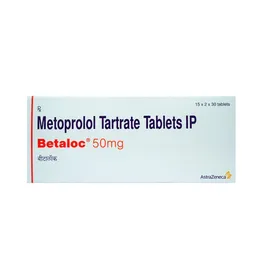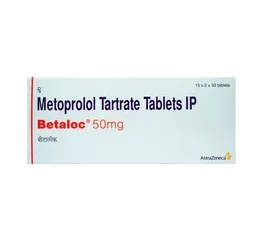Betaloc 50mg Tablet is a prescription medication primarily used to treat high blood pressure (hypertension), heart-related chest pain (angina), irregular heart rhythms (arrhythmia), and to manage complications after a heart attack (myocardial infarction). It contains Metoprolol, a beta-blocker that reduces the workload on the heart by slowing down the heart rate. By lowering blood pressure and improving cardiac efficiency, Betaloc helps protect the heart, blood vessels, and kidneys from long-term damage. It is usually taken orally, with or after food, as prescribed by a doctor. Consistent use is essential to achieve maximum therapeutic benefits. Patients with pre-existing conditions like asthma, low blood pressure, overactive thyroid, or severe circulation problems should consult their doctor before starting this medicine.
 Uses
Uses
- Treatment of Hypertension
Benefits of Betaloc 50mg
- Controls high blood pressure: Reduces the force and rate of heart contractions, lowering overall blood pressure.
- Prevents chest pain: Decreases the heart’s workload and improves blood flow, preventing angina episodes.
- Manages irregular heartbeats: Stabilizes heart rhythm and reduces symptoms associated with arrhythmias.
- Protects after heart attack: Minimizes stress on the heart, reducing the risk of further cardiac damage.
- Supports long-term cardiovascular health: Lowers risks of stroke, heart failure, and kidney complications.
 How Betaloc 50mg Tablet works
How Betaloc 50mg Tablet works
Betaloc 50mg Tablet contains Metoprolol, which blocks beta-adrenergic receptors in the heart. This slows the heart rate and reduces the force of each contraction. By lowering cardiac output, the medicine decreases blood pressure throughout the body. It also improves blood flow to the heart muscle, preventing chest pain and reducing the risk of heart attacks. Metoprolol stabilizes electrical signals in the heart, helping manage irregular heart rhythms. Slower heartbeats allow the heart to pump more efficiently with less oxygen demand. Over time, this reduces strain on the cardiovascular system.
 Side effects
Side effects
- Dizziness
- Slow heart rate (bradycardia)
- Drop in blood pressure when standing (orthostatic hypotension)
- Cold hands and feet
- Gastrointestinal issues






